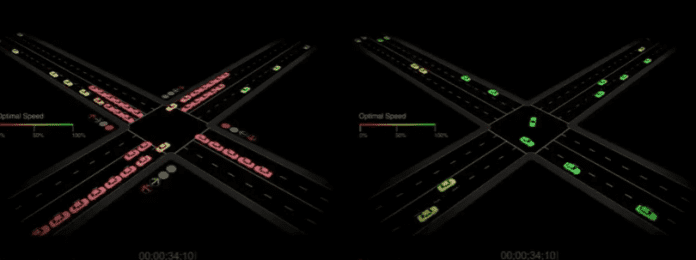Carlo Ratti, Director of the Senseable City Lab, MiT Department of Urban Studies and Planning, explains the senseable city concept in a keynote presentation at the Enterprise IoT Summit, in Austin, Texas.
Ratti starts his keynote presentation highlighting the fact that modern cities are being covered by many different types of sensors and networks which changed the interaction between citizens and government agencies.
The expert also mentioned that one of the most interesting developments in the mobility space is the car itself. “Cars are becoming almost like a computer on wheels. Most of vehicles today have a few thousands of sensors that record everything that happens in the vehicle. We are using all this real-time information provided by vehicles in order to better understand the cities.
Ratti also said that they have developed a new intersection control paradigm dubbed Autonomous Intersection Management (AIM), in which cars can cross street intersections without stopping. “We are currently working on this system from a mathematical point of view to see how to model the intersections,” he said.
Ratti added that the Senseable City Lab is also working in a project in the city of Amsterdam to develop a fleet of autonomous boats for the city’s canals.
The expert said that the ROBOAT project will develop a logistics platform for people and goods, superimposing a dynamic infrastructure over the Dutch city. This project imagines a fleet of autonomous boats for the transportation of goods and people that can also cooperate to produce temporary floating infrastructure, such as on-demand bridges or stages that can be assembled or disassembled in a matter of hours.
In addition to infrastructure and transport, ROBOAT will also deploy environmental sensing to monitor water quality and offer data for assessing and predicting issues related to public health, pollution, and the environment.
An architect and engineer by training, Carlo Ratti practices in Italy, where he is the founding partner of Carlo Ratti Associati studio, and teaches at the Massachusetts Institute of Technology, where he directs the Senseable City Lab. He graduated from the Politecnico di Torino and the École Nationale des Ponts et Chaussées in Paris, and later earned his MPhil and PhD at the University of Cambridge, UK.
Carlo holds several patents and has co-authored over 250 publications. As well as being a regular contributor to Project Syndicate, he has written for international media including New York Times, Washington Post, Financial Times, Scientific American, BBC, Il Sole 24 Ore, La Stampa, Corriere della Sera, Domus. His work has been exhibited worldwide at venues such as the Venice Biennale, the Design Museum Barcelona, the Science Museum in London, MAXXI in Rome, and MoMA The Museum of Modern Art in in New York City.
Carlo has been featured in Esquire Magazine’s ‘Best & Brightest’ list and in Thames & Hudson’s selection of ‘60 innovators’ shaping our creative future. Blueprint Magazine included him as one of the ‘25 People Who Will Change the World of Design’, Forbes listed him as one of the ‘Names You Need To Know’ and Fast Company named him as one of the ’50 Most Influential Designers in America’. He was also featured in Wired Magazine’s ‘Smart List: 50 people who will change the world’. Carlo was awarded the Renzo Piano Foundation prize for ‘New Talents in Architecture’. Two of his projects – the Digital Water Pavilion and the Copenhagen Wheel – have been included by TIME Magazine in the list of the ‘Best Inventions of the Year’.
Carlo has been a presenter at TED (in 2011 and 2015), program director at the Strelka Institute for Media, Architecture and Design in Moscow, curator of the ‘BMW Guggenheim Pavilion’ in Berlin, and was named ‘Inaugural Innovator in Residence’ by the Queensland Government.
He was the curator of the ‘Future Food District’ pavilion for the 2015 World Expo in Milan. He is currently serving as Chair of the World Economic Forum Global Agenda Council on Future Cities, and he has been selected as Special Adviser to the President and Commissioners of the European Commission, to advise on urban innovation.

